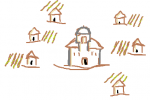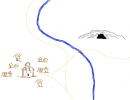HorizonsBoon
New Member
So basically i have a world which is supposed to have all these themes going for it. Scifi, dystopia, solar punk, magic
and i cant get it all together because im not sure where to start and from whos perspective, and making a group rp with it has been the mosts tressful experience i have had, and im trying REALLY hard.
Auuugh even now i dunno where to start
and i cant get it all together because im not sure where to start and from whos perspective, and making a group rp with it has been the mosts tressful experience i have had, and im trying REALLY hard.
Auuugh even now i dunno where to start



